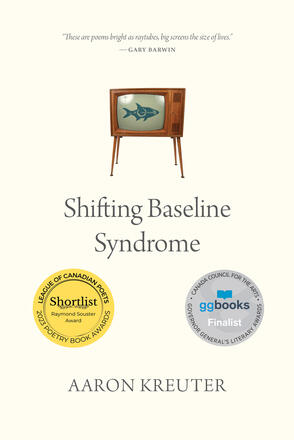
Shifting Baseline Syndrome
Description
Shifting Baseline Syndrome is a satirical and searing collection of poetry obsessed with television, oceans, Jewish history, and time. Aaron Kreuter asks the hard questions: what is it like to have an acid trip in a Porta Potti? Will the Anthropocene have a laugh track? Is it okay to marry your eighteenth cousin? How different would the world look from outside the life frame of the human?
Awards
- Short-listed, Raymond Souster Award 2023
- Short-listed, CBC Books Best Canadian Poetry 2022
- Short-listed, Governor General's Literary Award 2022
Reviews
Shortlisted, Raymond Souster Award 2023
Finalist, Governor General's Literary Award 2022
Shortlisted, CBC Books Best Canadian Poetry 2022"A would-be meet-cute scrounging for camaraderie at the end of history, this book is a stunning contribution to eco-literature and Jewish-Canadian writing alike." —Raymond Souster Awards
"Kreuter has found an admirable way to restore poetry to its ancient place as something very public and very political" —The Temz Review
“With a punk sensibility, Kreuter confronts the Anthropocene slantwise through X-Men and ancestry with biting humour, surprise, and tenderness. We discover primal interconnectedness, diasporic cousins, and the author’s radical Jewish ancestors over a pint and a piss. Shifting Baseline Syndrome is a book of poems to wake us up and rewild us.” —Shazia Hafiz Ramji, author of Port of Being
"Cleverly written." —The Miramichi Reader
“Cozy up on the couch with the remarkable Shifting Baseline Syndrome. It’s binge-worthy.” —Matthew Tierney, author of Midday at the Super-Kamiokande
“These are poems bright as raytubes, big screens the size of lives.” —Gary Barwin, author of For It Is a Pleasure and a Surprise to Breathe: New & Selected Poems and Yiddish for Pirates and Scotiabank Giller Prize and Governor General Award finalist“The strengths of Aaron Kreuter’s new collection lie in his ingenuity of wordplay; clever use of analogy; sense of humour; and a lively, honest engagement with popular culture.” —Arc Poetry